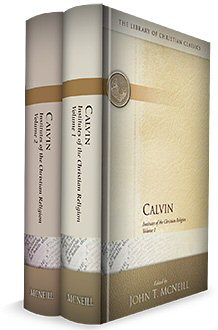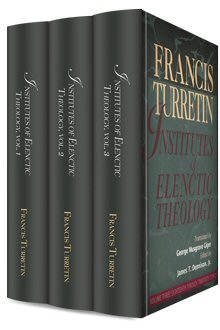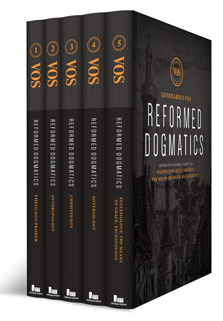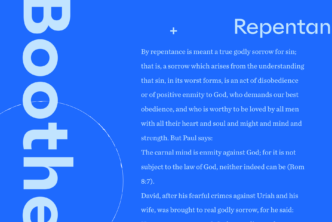Of the similarities between natural science and systematic theology, Charles Hodge writes: “If the object of the one be to arrange and systematize the facts of the external world, and to ascertain the laws by which they are determined; the object of the other is to systematize the facts of the Bible, and ascertain the principles or general truths which those facts involve.” Similarly, Michael Horton, in his The Christian Faith: A Systematic Theology for Pilgrims on the Way, writes that systematic theology “is like the box top of a jigsaw puzzle, and every believer is a theologian in the sense of putting the pieces together. If we fail to recognize there is a box top (i.e., a unified whole) to Scripture, we will have only a pile of pieces.”
John Calvin’s Institutes of the Christian Religion
For nearly 500 years, Calvin’s Institutes has been a bastion of Reformed systematic theology. Calvin wrote the first edition in Latin in the mid–sixteenth century, with a French edition published shortly thereafter; several English translations have appeared through the nineteenth century from both the Latin and the French editions. The Institutes is comprehensive and surprisingly pastoral, originally meant as an introduction to Christian faith and doctrine. Calvin’s magnum opus is still used in seminaries around the world today, and several translations are available in Logos, including the definitive English translation by John McNeill, available for pre-order.
 Francis Turretin’s Institutes of Elenctic Theology
Francis Turretin’s Institutes of Elenctic Theology
Francis Turretin pastored a church in Geneva, and was known as a strong defender of orthodox Calvinism. His seminal work is often called one of the most undervalued systematic theologies in Reformed history. Institutes of Elenctic Theology has been praised by the likes of Richard Gaffin, John Frame, James Boice, Wayne Grudem, and Norman Geisler. These volumes were required reading at old Princeton, and were dutifully studied by such giants in systematics as Charles Hodge, B. B. Warfield, and Louis Berkhof. R. Scott Clark writes, “One of the greatest of the seventeenth-century Reformed dogmatic works, it has retained its influence through its use at old Princeton. These three volumes put in your hands an excellent representative of high Reformed orthodoxy and polemical theology.”
Benedict Pictet’s Christian Theology
Pictet, like Turretin and Calvin before him, also hailed from Geneva. His Christian Theology is a well-organized and convincing presentation of theology. Anyone familiar with, for instance, Warfield’s views on plenary inspiration will recognize the same strain of thought in Pictet’s writings, and will find excellent hermeneutics and exegesis employed in Pictet’s use of Scripture, out of which all his theology flows.
 Geerhardus Vos’ Reformed Dogmatics
Geerhardus Vos’ Reformed Dogmatics
A couple hundred years later, Geerhardus Vos wrote this remarkable systematic theology. Vos wrote in Dutch, but the English translation (with Dr. Richard Gaffin leading the translation team) is available for pre-order. Like Turretin’s Institutes, Vos’ Reformed Dogmatics is written in a succinct Q&A format, which makes it an immensely helpful reference tool and research aid. Here’s an excerpt, demonstrating Vos’ brevity and clarity:
“What is the relation between God’s decree, His free knowledge, and the free actions of men?
God’s decree grounds the certainty of His free knowledge and likewise the occurring of free actions. Not foreknowledge as such but the decree on which it rests makes free actions certain.”
Want More Systematics?
Check out the volumes mentioned above:
- Institutes of the Christian Religion (2 vols.) by John Calvin
- Institutes of Elenctic Theology (3 vols.) by Francis Turretin (also in Latin)
- Christian Theology by Benedict Pictet
- Reformed Dogmatics (5 vols.) by Geerhardus Vos (also in Dutch)
- Christian Theology, 3rd. ed. by Millard J. Erickson
- A Puritan Theology: Doctrine for Life by Joel R. Beeke and Mark Jones
- The Christian’s Reasonable Service (4 vols.) by Wilhelmus à Brakel







